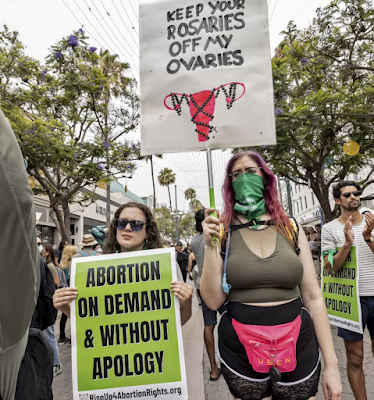Based on 2017 data collected by the pro-choice Guttmacher Institute, Goldstein and Sasani note, "there were 4,460 pregnancies among girls under 15, with about 44 percent ending in abortion." That amounts to 1,962 abortions in this age group, or about 0.2 percent of the total in 2017.
 |
| Ted Soqui - Sipa USA/ Newscom |
Ectopic pregnancies, where an egg develops outside of a uterus, are also uncommon but not rare. It is estimated to occur in one out of fifty pregnancies, or 2%. This condition can be fatal to the mother and is always fatal to the embryo.
Unfortunately, women are going without treatment for this condition, post Dobbs, because doctors don't want to get prosecuted for murder. The recent Supreme Court decision is putting the health of women at risk by leaving the reproductive decisions to states rather than to women and their medical advisors. From MSNBC:
It hasn’t quite been a month since Dobbs v. Jackson Women’s Health Organization was handed down, and already the gut-wrenching stories are piling up.
The Washington Post highlighted one woman with a life-threatening ectopic pregnancy who had to seek emergency care in a different state because a local doctor thought Republican-imposed restrictions would’ve made it illegal to treat her — even though the pregnancy would’ve killed her, and even though the pregnancy wasn’t viable.
The same article reported on a Wisconsin woman who bled for more than 10 days from an incomplete miscarriage after emergency room staff were afraid that removing fetal tissue would be against state law.
The Advocate newspaper in Baton Rouge reported on a woman whose water broke after 16 weeks of pregnancy. Her doctor wanted to perform a type of abortion procedure to remove the nonviable fetus, but an attorney said this might also be illegal.
The article added that according to an affidavit filed by the doctor, the woman preferred the abortion, but instead “was forced to go through a painful, hours-long labor to deliver a nonviable fetus, despite her wishes and best medical advice.” She ultimately hemorrhaged nearly a liter of blood.
The New York Times reported on a Texas woman who went to the hospital for a first-trimester miscarriage and requested a surgical evacuation procedure. The hospital reportedly refused.The Associated Press’ report noted two Ohio women who had ectopic pregnancies — which, again, can be life-threatening and which are by definition nonviable — and were told by their doctors that they could not receive treatment.
The AP also spoke to Dr. Jessian Munoz, an OB-GYN in San Antonio, about a recent patient who’d started to miscarry and developed a dangerous womb infection. The standard treatment would’ve been an immediate abortion, but that was no longer a legal option in the state.
Rare or not, is it fair to let the state interfere with and jeopardize the lives of these women? And are we willing as a society to let these women suffer and die in order to protect unborn fetuses? Are they fair collateral damage in the new religious war?


No comments:
Post a Comment